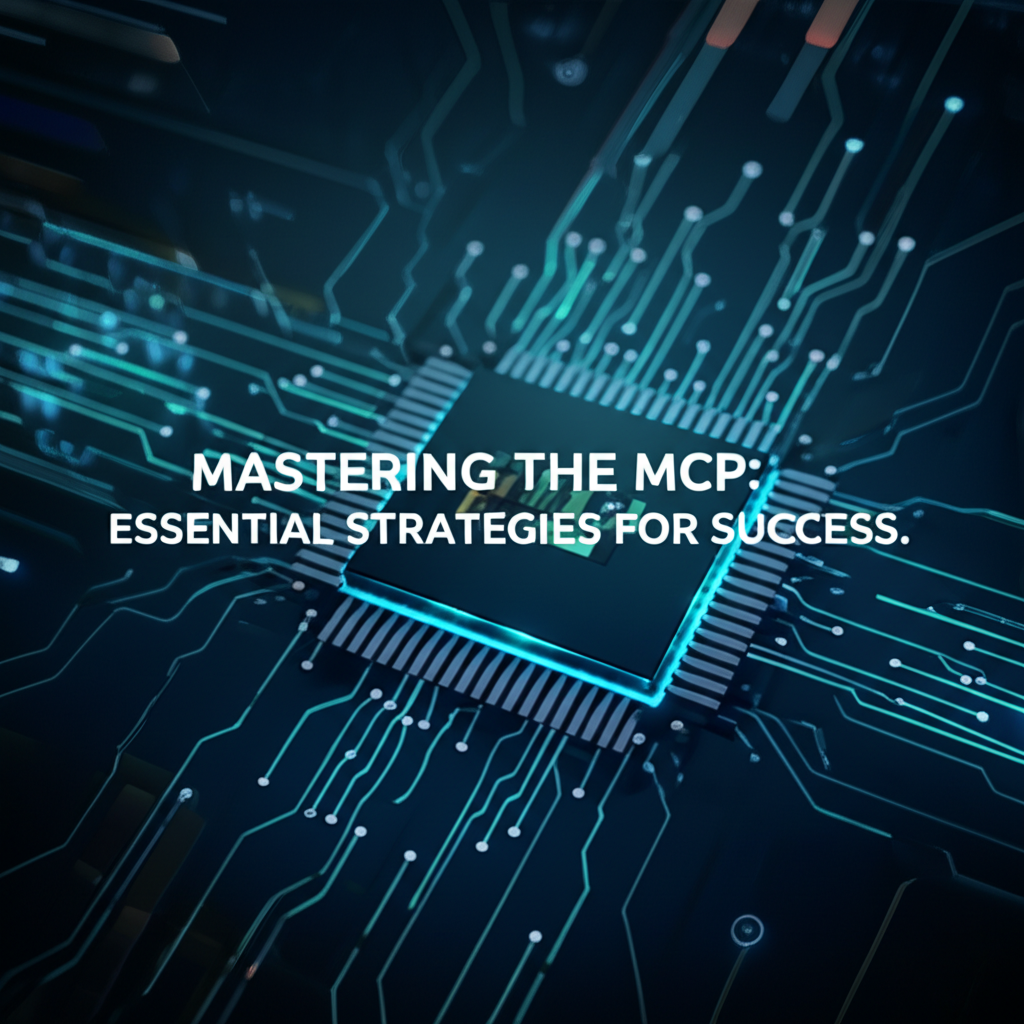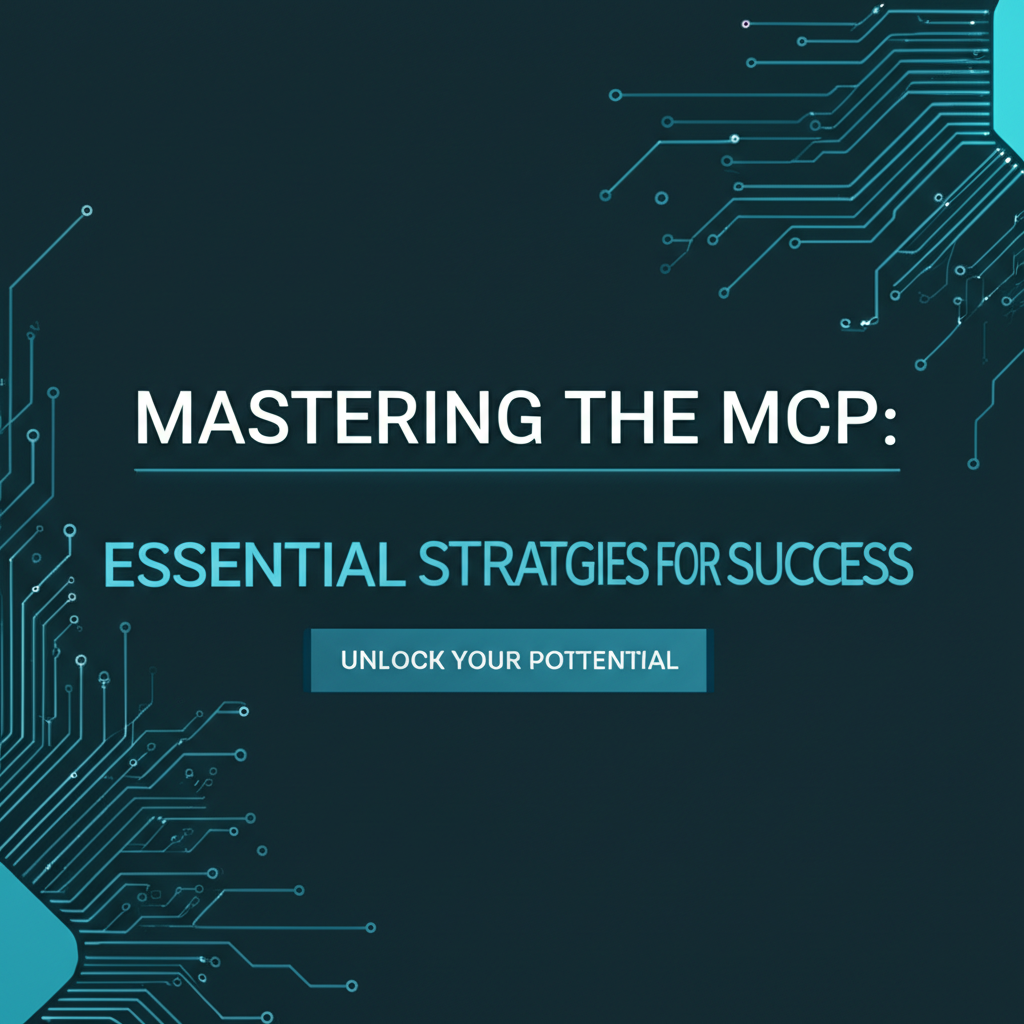Mastering the MCP: Essential Strategies for Success

Build AI Agents With Incredible MCP
Introduction
The Model Context Protocol (MCP) has emerged as a cornerstone in the realm of artificial intelligence (AI). As AI agents become more prevalent in various industries, the need for a standardized protocol to facilitate seamless communication and integration between these agents and their environments is paramount. This article delves into the essentials of mastering the MCP, exploring key strategies for success in leveraging this innovative technology. By the end, you'll have a comprehensive understanding of MCP tools, platforms, and best practices to ensure your AI initiatives thrive.
Understanding MCP
What is MCP?
The Model Context Protocol (MCP) is a set of standards and specifications designed to enable AI agents to interact with their environment effectively. It serves as a bridge between AI agents and the myriad of data sources and tools available, facilitating real-time data access, decision-making, and action execution.
MCP Tools
MCP tools are the software components that enable the implementation of the MCP. These tools range from development frameworks to runtime engines, each playing a crucial role in the seamless operation of MCP-compliant systems.
Development Frameworks
Development frameworks provide the necessary tools and libraries for developers to create MCP-compliant applications. They often include features such as API documentation, sample code, and debugging tools.
Runtime Engines
Runtime engines are responsible for executing MCP protocols in real-time. They ensure that AI agents can access and process data from various sources efficiently.
Selecting the Right MCP Platform
What to Look For
When choosing an MCP platform, several factors should be considered to ensure compatibility, scalability, and ease of integration with existing systems.
Compatibility
An MCP platform should be compatible with a wide range of data sources and tools, ensuring seamless integration with your existing infrastructure.
Scalability
As your AI initiatives grow, your MCP platform should be able to scale accordingly, accommodating increased data volumes and user demands.
Ease of Integration
The platform should offer straightforward integration with your current systems, minimizing the need for extensive development work.
Top MCP Platforms
Among the numerous MCP platforms available, several stand out for their robust features and user-friendly interfaces.
XPack.AI
XPack.AI is a cutting-edge MCP platform that enables AI agents to connect with thousands of real-world data sources and tools in under a minute. It offers faster performance, lower costs, and a superior user experience with minimal configuration.
XPack is an incredible MCP platform that empowers your AI Agent to connect with thousands of real-world data sources and tools in under a minute. Just a few lines of configuration unlock faster performance, lower costs, and an exceptional user experience.Try XPack now! 👇👇👇
Implementing MCP in Your Organization
Step-by-Step Guide
- Assess Your Needs: Evaluate your organization's data sources, tools, and AI initiatives to determine the specific requirements for your MCP implementation.
- Choose the Right Platform: Select an MCP platform that aligns with your needs, ensuring compatibility, scalability, and ease of integration.
- Develop and Test: Utilize the platform's development frameworks to create MCP-compliant applications and thoroughly test them for functionality and performance.
- Deploy: Once your applications are ready, deploy them in your organization, ensuring a smooth transition for end-users.
- Monitor and Optimize: Continuously monitor the performance of your MCP implementation and optimize as needed to ensure maximum efficiency.
Case Studies
Case Study 1: Retail Industry
A retail company implemented MCP to streamline inventory management. By integrating their inventory system with an MCP platform, they were able to automate restocking processes, reducing costs and improving customer satisfaction.
Case Study 2: Healthcare Sector
A healthcare provider utilized MCP to enhance patient care. By connecting their electronic health records with an MCP platform, they were able to provide real-time insights to healthcare professionals, leading to more accurate diagnoses and improved patient outcomes.
Data Analysis
To better understand the impact of MCP on various industries, we've compiled the following data analysis:
| Industry | MCP Implementation | Benefits |
|---|---|---|
| Retail | Inventory Management | Reduced costs, improved customer satisfaction |
| Healthcare | Patient Care | More accurate diagnoses, improved patient outcomes |
| Manufacturing | Supply Chain Optimization | Streamlined production processes, reduced lead times |
| Finance | Risk Management | Enhanced decision-making, improved risk assessment |
Conclusion
Mastering the Model Context Protocol (MCP) is essential for organizations looking to leverage the full potential of AI. By selecting the right MCP platform, implementing best practices, and continuously optimizing your MCP initiatives, you can ensure that your AI agents operate efficiently and effectively. XPack.AI is a powerful MCP platform that can help you achieve these goals.
FAQ
What is the Model Context Protocol (MCP)?
The Model Context Protocol (MCP) is a set of standards and specifications designed to enable AI agents to interact with their environment effectively.
How does MCP benefit my organization?
MCP can streamline data access, decision-making, and action execution for AI agents, leading to improved efficiency and productivity.
What are some popular MCP platforms?
Some popular MCP platforms include XPack.AI, which offers fast performance, low costs, and a superior user experience.
How do I implement MCP in my organization?
To implement MCP, assess your needs, choose the right platform, develop and test your applications, deploy them, and continuously monitor and optimize your implementation.
Can MCP be integrated with existing systems?
Yes, MCP can be integrated with existing systems, provided the platform you choose is compatible and offers straightforward integration options.
How does MCP improve AI agent performance?
MCP ensures that AI agents have access to the necessary data and tools to make informed decisions and execute actions efficiently.
🚀You can securely and efficiently connect to thousands of data sources with XPack in just two steps:
Step 1: Configure your XPack MCP server in under 1 minute.
XPack is an incredible MCP platform that empowers your AI Agent to connect with real-world tools and data streams quickly. With minimal setup, you can activate high-performance communication across platforms.
Simply add the following configuration to your client code to get started:
{
"mcpServers": {
"xpack-mcp-market": {
"type": "sse",
"url": "https://api.xpack.ai/v1/mcp?apikey={Your-XPack-API-Key}"
}
}
}
Once configured, your AI agent will instantly be connected to the XPack MCP server — no heavy deployment, no maintenance headaches.

Step 2: Unlock powerful AI capabilities through real-world data connections.
Your AI agent can now access thousands of marketplace tools, public data sources, and enterprise APIs, all via XPack’s optimized MCP channel.

